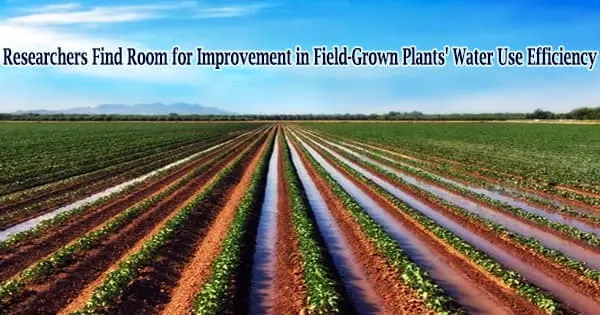According to a 2019 water study from the Food and Agriculture Organization (FAO) of the United Nations, water deficit is currently one of the major problems restricting worldwide agricultural productivity, a factor that is further aggravated by global climate change.
In order to better adapt to water-scarce situations, experts from all over the world have been attempting to increase the water-use efficiency of crops.
Researchers from the University of Illinois, the Volcani Center (Agricultural Research Organization, Israel), and the University of Cambridge discovered that by overexpressing the sugar-sensing enzyme hexokinase in field-grown tobacco plants, they could increase intrinsic water-use efficiency (iWUE) without affecting photosynthetic rates or biomass production. Their findings were recently published in the Journal of Experimental Botany.
Because it is very simple to deal with in the lab, greenhouse, and field, tobacco was chosen as a model crop. Results in this crop can be observed much more quickly than in food crops, which require more effort and time to cultivate and change.
So, in order to determine whether similar effects could be demonstrated, tobacco was chosen as the first test crop. The researchers can confidently replicate the advancements in food crops including cassava, cowpea, rice, and soybean after demonstrating success in the model crop.
According to field conditions and a mild water restriction, this study shows that it is possible to produce plants that consume less water throughout the growing season without suffering a major yield hit. This might help farmers use less irrigation and use less soil water throughout the growing season.
To improve our understanding of the potential benefits of guard-cell-targeted AtHXK1, our study used two homozygous transgenic lines expressing AtHXK1 and a line that had guard-cell-targeted overexpression of AtHXK1 that were evaluated relative to wild-type field-grown tobacco to test WUE for traits related to photosynthesis and yield.
Johannes Kromdijk
This research is a component of Realizing Increased Photosynthetic Efficiency (RIPE), an international research initiative funded by the Bill & Melinda Gates Foundation, Foundation for Food & Agriculture Research, and U.K. Foreign, Commonwealth & Development Office. RIPE aims to increase global food production by developing food crops that convert solar energy into food more effectively.
To absorb CO2 during photosynthesis, plants create microscopic pores in their leaves known as stomata. However, water can also escape by transpiration when the pores are open. As a result, plants are forced to choose between losing too much water and absorbing CO2.
“Stomatal pores consist of a pair of guard cells that control the opening and closure of the pores,” said Liana Acevedo-Siaca, who led this study at Illinois during her time as a postdoctoral researcher.
“Previous studies have shown that genetic manipulation of signal elements that trigger stomatal movement, such as overexpressing Arabidopsis Hexokinase 1 (AtHXK1) in the guard cells, can stimulate stomatal closure and adjust that trade-off for plants.”
Acevedo-Siaca is currently employed with the International Maize and Wheat Improvement Center (CIMMYT) in Mexico as an Associate Scientist in the Global Wheat Program.
It has been demonstrated that guard-cell-targeted AtHXK1 expression can increase crops’ WUE and resistance to salinity stress and drought because hexokinase tells the pores there is enough sugar, preventing the need to fix more CO2.
These earlier research, however, only looked at crops produced in greenhouses or other controlled conditions.
“To improve our understanding of the potential benefits of guard-cell-targeted AtHXK1, our study used two homozygous transgenic lines expressing AtHXK1 and a line that had guard-cell-targeted overexpression of AtHXK1 that were evaluated relative to wild-type field-grown tobacco to test WUE for traits related to photosynthesis and yield,” said Johannes Kromdijk, assistant professor at the University of Cambridge, who started this study in 2018.
“Our results confirmed that constitutive overexpression AtHXK1 decreases productivity. We also showed that guard-cell-targeted overexpression of AtHXK1 could improve iWUE relative to wild-type without negatively impacting CO2 assimilation. Still, this difference was strongly dependent upon leaf age, and recent rainfall could eliminate differences in performance.”
The RIPE project and its backers are dedicated to securing Global Access and making the project’s innovations accessible to the farmers who need them the most.





